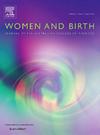Evaluating knowledge, attitudes and preparedness of health care providers to respond to intimate partner violence in the Western Pacific Region: A scoping review
IF 4.1
2区 医学
Q1 NURSING
引用次数: 0
Abstract
Background
Intimate partner violence (IPV) during pregnancy is a prevalent human rights issue as well as a serious public health issue. Adverse health outcomes of IPV are no longer in doubt; however, there continues to be a lack of acknowledgement of the importance of health sectors response to recognise and support survivors of violence, especially in low- and middle-income countries [7]; Khalil et al., 2016).
Objectives
The aim of the scoping review was to identify, synthesise, appraise, and report on relevant literature in the Western Pacific Region and to identify any gaps in knowledge, attitudes, and preparedness of health care providers towards IPV identification during pregnancy in relation to maternal health service provision.
Method
A scoping review was conducted following the Joanna Briggs Institute guideline. A comprehensive search of research databases was conducted across six different databases. The review included peer-reviewed articles published in English from January 2000 to May 2023, with a primary focus on identifying literature conducted within the Western Pacific Region (WPR). Reference lists of included studies were also searched for any relevant literature. Titles and abstracts of the papers retrieved were reviewed by two reviewers. A third reviewer was used to resolve discrepancies using systematic review software. Key characteristics of the included studies were mapped and analysed using content analysis to synthesize and report findings.
Findings
Twelve articles were included in the review. Eight articles were conducted in Australia a high-income country. The remaining four articles were from low- and-middle-income countries (LMIC), China, Philippines, Vietnam, and Malaysia. The findings were grouped into three main themes: (1) ‘Lack of healthcare providers knowledge and understanding of IPV as a health issue’, (2) ‘Lack of health care provider confidence to respond to IPV’, and (3) ‘Preparedness of healthcare providers to address IPV within the healthcare sector’.
Conclusion and recommendations
Adequate knowledge and awareness of IPV as a prevalent public health issue with detrimental effects on the health of women and children enhance the ability of care providers to respond effectively to IPV within the health sector.
A lack of healthcare provider competence in identifying and responding to IPV results in missed opportunities to address the health and social impacts of IPV. Further research is needed to identify screening practices for IPV in LMICs of the WPR, where the health and social burden is significant.
评价西太平洋区域卫生保健提供者应对亲密伴侣暴力的知识、态度和准备:范围审查
背景怀孕期间的最终伴侣暴力是一个普遍的人权问题,也是一个严重的公共卫生问题。IPV的不良健康后果已不再是疑问;然而,人们仍然没有认识到卫生部门应对措施对承认和支持暴力幸存者的重要性,特别是在低收入和中等收入国家[b];Khalil et al., 2016)。目的:范围审查的目的是识别、综合、评估和报告西太平洋地区的相关文献,并确定卫生保健提供者在与孕产妇保健服务提供有关的怀孕期间IPV识别方面的知识、态度和准备方面的任何差距。方法根据乔安娜布里格斯研究所的指导方针进行范围审查。在六个不同的数据库中进行了研究数据库的全面搜索。该综述包括2000年1月至2023年5月期间发表的同行评议的英文文章,主要侧重于确定在西太平洋地区(WPR)进行的文献。还检索了纳入研究的参考文献列表,以查找相关文献。检索到的论文的标题和摘要由两位审稿人审阅。第三位审稿人使用系统审查软件来解决差异。对纳入研究的关键特征进行制图和分析,使用内容分析来综合和报告研究结果。12篇文章被纳入综述。八篇文章是在高收入国家澳大利亚进行的。其余四篇文章来自中低收入国家(LMIC)、中国、菲律宾、越南和马来西亚。调查结果分为三个主题:(1)“缺乏卫生保健提供者对IPV作为健康问题的知识和理解”,(2)“缺乏卫生保健提供者应对IPV的信心”,以及(3)“卫生保健提供者在卫生保健部门内解决IPV的准备”。结论和建议充分了解和认识到IPV是一个普遍存在的公共卫生问题,对妇女和儿童的健康产生有害影响,可提高保健提供者在卫生部门内有效应对IPV的能力。卫生保健提供者在识别和应对IPV方面缺乏能力,导致错过了处理IPV对健康和社会影响的机会。需要进一步研究,以确定在卫生和社会负担严重的低收入国家中进行IPV筛查的做法。
本文章由计算机程序翻译,如有差异,请以英文原文为准。
求助全文
约1分钟内获得全文
求助全文
来源期刊

Women and Birth
NURSING-OBSTETRICS & GYNECOLOGY
CiteScore
7.20
自引率
13.20%
发文量
371
审稿时长
27 days
期刊介绍:
Women and Birth is the official journal of the Australian College of Midwives (ACM). It is a midwifery journal that publishes on all matters that affect women and birth, from pre-conceptual counselling, through pregnancy, birth, and the first six weeks postnatal. All papers accepted will draw from and contribute to the relevant contemporary research, policy and/or theoretical literature. We seek research papers, quality assurances papers (with ethical approval) discussion papers, clinical practice papers, case studies and original literature reviews.
Our women-centred focus is inclusive of the family, fetus and newborn, both well and sick, and covers both healthy and complex pregnancies and births. The journal seeks papers that take a woman-centred focus on maternity services, epidemiology, primary health care, reproductive psycho/physiology, midwifery practice, theory, research, education, management and leadership. We also seek relevant papers on maternal mental health and neonatal well-being, natural and complementary therapies, local, national and international policy, management, politics, economics and societal and cultural issues as they affect childbearing women and their families. Topics may include, where appropriate, neonatal care, child and family health, women’s health, related to pregnancy, birth and the postpartum, including lactation. Interprofessional papers relevant to midwifery are welcome. Articles are double blind peer-reviewed, primarily by experts in the field of the submitted work.
 求助内容:
求助内容: 应助结果提醒方式:
应助结果提醒方式:


